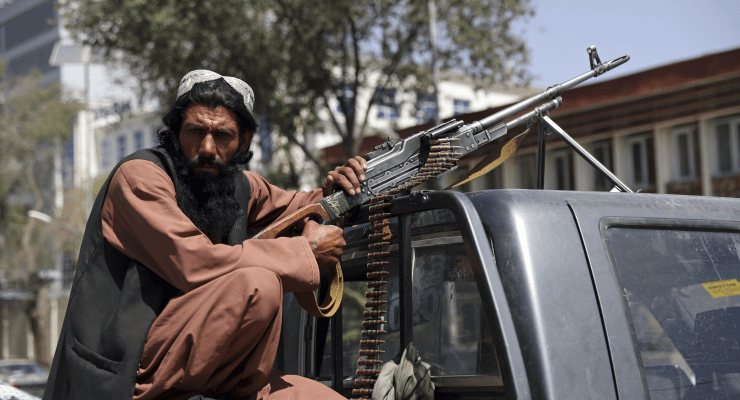
Mariam* is shocked by how quickly Kabul fell.
“In Kabul, it’s literally chaos,” she said. “It happened so quickly that people didn’t even find the time to get to another country. We thought the city had at least two months. Then it happened overnight. It’s horrible.”
Mariam has been lucky. She worked as an interpreter for Australian troops between 2016 and 2017. In March, two years after applying for a locally engaged employee visa (LEE), she arrived in Australia. She’d got out in time to escape the Taliban’s dramatic advance across the country. But she’s spent the past six months trying to bring her immediate family with her.
“My priority is to get them to a safe country, which is impossible right now,” she said. “I was hoping to get them to Malaysia. [But] the airport is in chaos. People have rushed there; there are no flights.”
Shocking footage circulated last night of people clinging to the engines of a US military plane leaving Kabul’s Hamid Karzai International Airport.
Mariam’s family is in particular danger. There have already been targeted killings of people who worked with Western forces — and their families. They also come from a Shia minority group, whose mere existence is incompatible with the Taliban’s hard-line Sunni-fundamentalist worldview.
And her family remembers what it was like before. The last time the Taliban held power, between 1996 and 2001, their utterly repressive brand of sharia law turned Afghanistan into a country without music, where women couldn’t go to school or leave the house alone, where crimes could be punished with stonings or public executions.
Now the Taliban is trying to persuade the West it has mellowed during 20 years of brutal insurgency. They have a public relations guy who goes on Twitter describing news reports of forced marriage as “poisonous propaganda”. They have promised to let evacuations out of Kabul proceed peacefully.
Mariam does not trust them to keep their word.
“They’re people who’ve come from the mountains,” she said. “They’re not educated; they haven’t seen the world. How do I expect them to understand the rights of women, of minority groups?
“In the other provinces, they’ve left behind murder and bloodhshed.”
And as an Afghan woman who came of age in a post-Taliban world, where she could access higher education and have opportunities the Islamist group wants to lock away, she’s devastated at what her country’s future might look like.
“My friends at university in Kabul are really worried,” she said. “In Herat, the Taliban closed universities to women. They said they couldn’t come in until further decisions, and it’s not clear if they’ll ever come back.”
And while the Taliban have so far committed to a peaceful transition of power in Kabul, after President Ashraf Ghani fled, she says her friends describe the eerie disquiet in the city as “the calm before the storm”.
She hopes the Taliban will at least let people freely leave the country. But the Western powers who occupied Afghanistan are not helping those people leave. Australia didn’t let Mariam bring her brother with her. The government is trying to land an evacuation flight to rescue a few hundred people. But many more will be left behind, unable to even get a visa.
“I’d like to ask the Australian government: why is it so silent? It’s powerful; it has to help families come here. Give us a safe home,” Mariam said.
“Canada is offering lots of visas; America is offering thousands. Why can’t Australia do this? It’s a small act, but it means the world to people.”
*Real name withheld to protect the safety of family.








Sadly, I don’t believe the party that stood behind Robodebt that punished Australians citizens will offer timely support to foreigners in Afghanistan.
Betcha Taliban are claiming overwhelming victory as a miracle from their Almighty.
Like our Scomo claiming his miracle victory the work of his Almighty. Hope it works out better for the Afghanistan people than it has for us.
The first time that I’ve heard Dutton in weeks – far too short – this evening on PM he claimed that the “government is trying to land an evacuation flight to rescue a few hundred people” and then went on to describe them – Australians, Canadians, NZers and Europeans – quel bloody surprise!.
Mariam, on behalf of the very large group of people who are not represented by this poor excuse for a government, I apologise, most sincerely. I’d vote them out in a second, but I already did at the last election, and many before that.
Extreme Sunnis are incredibly obtuse and aggressively righteous, as bad as any extremists anywhere. Untrustworthy by “our standards”, they have waited quietly but ready for twenty years to reclaim their country and run it as they see fit. “We” should never have been there or anywhere similar, telling others we misunderstand how to live. Did Trump fumble here and betray us all? Biden must survive this and pursue other diplomatic essentials. How low is our own imperial oaf, Jack Howard?